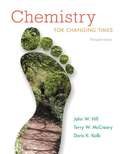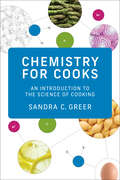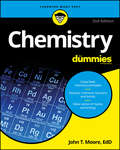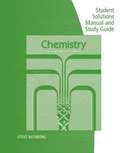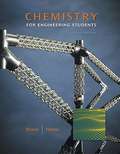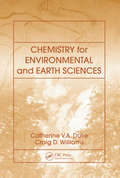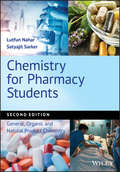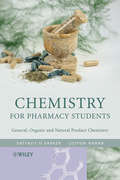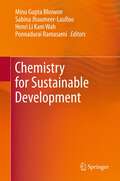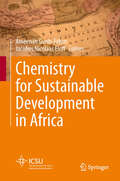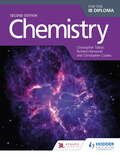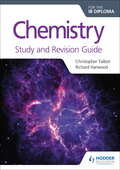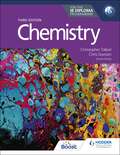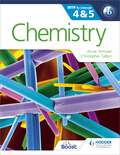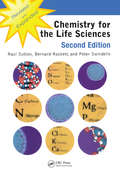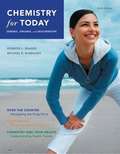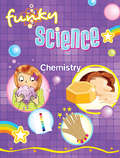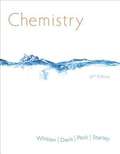- Table View
- List View
Chemistry for Changing Times (13th Edition)
by Terry W. McCreary Doris K. Kolb John W. HillThe book that defined the liberal arts chemistry course, Chemistry for Changing Times remains the most visually appealing and readable introduction on the subject. The Thirteenth Edition increases its focus on student engagement – with revised “Have You Ever Wondered?” questions, new Learning Objectives in each chapter linked to end of chapter problems, and new Green Chemistry content, closely integrated with the text. Abundant applications and examples fill each chapter, and material is updated throughout to mirror the latest scientific developments in a fast-changing world. Compelling chapter opening photos, a focus on Green Chemistry, and the “It DOES Matter” features highlight current events and enable students to relate to the book more readily.
Chemistry for Christian Schools
by Heather E. Cox Thomas E. Porch John S. WetzelChemistry for Christian Schools- in addition to having problems in abundance for student practice, also talks about the history of chemistry and about many ways that Christianity and chemistry are related.
Chemistry For Competitive Examination-1 First Semester FYBA, B.COM, B.SC New NEP Syllabus - SPPU
by Prof. Dr. G. S. Gugale Prof. Dr. R. P. Patil Dr Y. R. Baste Dr C. N. Potangale"Chemistry for Competitive Examination-1" is a comprehensive textbook for First Year B.A., B.Com., and B.Sc. students, following the 2024 NEP syllabus. Authored by Prof. (Dr.) G. S. Gugale, Dr. Y. R. Baste, Prof. (Dr.) R. P. Patil, and Dr. C. N. Potangale, the book covers fundamental concepts in Physical, Inorganic, and Organic Chemistry, along with miscellaneous topics essential for competitive exams. Key areas include atomic structure, chemical bonding, periodic table, hydrocarbons, polymers, explosives, and drug chemistry. The book provides detailed explanations, examples, and exercises to help students build a strong foundation in chemistry for both academic and competitive examinations.
Chemistry for Cooks: An Introduction to the Science of Cooking
by Sandra C. GreerA fun approach to teaching science that uses cooking to demonstrate principles of chemistry for undergraduate students who are not science majors, high school students, culinary students, and home cooks.How does an armload of groceries turn into a culinary masterpiece? In this highly accessible and informative text, Sandra C. Greer takes students into the kitchen to show how chemistry—with a dash of biology and physics—explains what happens when we cook. Chemistry for Cooks provides all the background material necessary for nonscientists to understand essential chemical processes and to see cooking as an enjoyable application of science. Greer uses a variety of practical examples, including recipes, to instruct readers on the molecular structure of food, the chemical reactions used in cooking to change the nature of food, and the essentials of nutrition and taste. She also offers kitchen hints and exercises based on the material in each chapter, plus do-it-yourself projects to encourage exploration of the chemistry that takes place when we cook food. FeaturesPerfect for science courses aimed at non–science majors: does not require prior knowledge of chemistry, physics, or biologyEqually useful for general readers, home and professional cooks, and culinary studentsTopics include what matter is made of, how the structure of matter is altered by heat, how we treat food in order to change its microscopic structure, why particular procedures or methods are used in the kitchen, and how to think critically about various cooking methodsA reference section at the end of each chapter points readers to resources for further studyAdditional online resources include a solutions manual, a sample syllabus, and PowerPoint slides of all tables and figures
Chemistry For Dummies
by John T. MooreSee how chemistry works in everything from soaps to medicines to petroleumWe're all natural born chemists. Every time we cook, clean, take a shower, drive a car, use a solvent (such as nail polish remover), or perform any of the countless everyday activities that involve complex chemical reactions we're doing chemistry! So why do so many of us desperately resist learning chemistry when we're young?Now there's a fun, easy way to learn basic chemistry. Whether you're studying chemistry in school and you're looking for a little help making sense of what's being taught in class, or you're just into learning new things, Chemistry For Dummies gets you rolling with all the basics of matter and energy, atoms and molecules, acids and bases, and much more!Tracks a typical chemistry course, giving you step-by-step lessons you can easily graspPacked with basic chemistry principles and time-saving tips from chemistry professorsReal-world examples provide everyday context for complicated topicsFull of modern, relevant examples and updated to mirror current teaching methods and classroom protocols, Chemistry For Dummies puts you on the fast-track to mastering the basics of chemistry.
Chemistry for Engineering Students: Student Solutions and Study Guide
by Lawrence S. Brown Thomas A. Holme Steve RathboneThe STUDENT SOLUTIONS MANUAL AND STUDY GUIDE provides students with a comprehensive guide to working the solutions to the odd-numbered end-of-chapter problems in the text and also includes each chapter's Study Goals and Chapter Objective quizzes. Because the best way for students to learn and understand the concepts is to work multiple, relevant problems on a daily basis and to have reinforcement of important topics and concepts from the book, the STUDENT SOLUTIONS MANUAL gives students instant feedback by providing not only the answers to problems, but also detailed explanations of each problem's solution.
Chemistry for Engineering Students (Second Edition)
by Lawrence S. Brown Thomas A. HolmeEnhanced with a remarkable number of new problems and applications, the Second Edition of CHEMISTRY FOR ENGINEERING STUDENTS provides a concise, thorough, and relevant introduction to chemistry that prepares students for further study in any engineering field.
Chemistry for Environmental and Earth Sciences
by Catherine Vanessa Duke Craig Denver WilliamsChemistry for Environmental and Earth Sciences focuses on the chemistry and processes behind environmental issues such as global warming, ozone depletion, acid rain, water pollution, and soil contamination. Accessible to science as well as non-science majors, this textbook is divided into four intuitive chapters: Fire, Earth, Water, and Air. It uses worked examples and case studies drawn from current applications along with clear diagrams and concise explanations to illustrate the relevance of chemistry to geosciences. In-text and end-of-chapter questions with complete solutions also help students gain confidence in applying concepts from this book towards solving current, real-world problems.
Chemistry for Pharmacy Students: General, Organic and Natural Product Chemistry
by Lutfun Nahar Satyajit SarkerIntroduces the key areas of chemistry required for all pharmacy degree courses and focuses on the properties and actions of drug molecules This new edition provides a clear and comprehensive overview of the various areas of general, organic, and natural products chemistry (in relation to drug molecules). Structured to enhance student understanding, it places great emphasis on the applications of key theoretical aspects of chemistry required by all pharmacy and pharmaceutical science students. This second edition particularly caters for the chemistry requirements in any ‘Integrated Pharmacy Curricula’, where science in general is meant to be taught ‘not in isolation’, but together with, and as a part of, other practice and clinical elements of the course. Chemistry for Pharmacy Students: General, Organic and Natural Product Chemistry, 2nd Edition is divided into eight chapters. It opens with an overview of the general aspects of chemistry and their importance to modern life, with emphasis on medicinal applications. The text then moves on to discuss the concepts of atomic structure and bonding and the fundamentals of stereochemistry and their significance to pharmacy in relation to drug action and toxicity. Various aspects of organic functional groups, organic reactions, heterocyclic chemistry, nucleic acids and their pharmaceutical importance are then covered in subsequent chapters, with the final chapter dealing with drug discovery and development, and natural product chemistry. Provides a student-friendly introduction to the main areas of chemistry required by pharmacy degree courses Written at a level suitable for non-chemistry students in pharmacy, but also relevant to those in life sciences, food science, and the health sciences Includes learning objectives at the beginning of each chapter Focuses on the physical properties and actions of drug molecules Chemistry for Pharmacy Students: General, Organic and Natural Product Chemistry, 2nd Edition is an essential book for pharmacy undergraduate students, and a helpful resource for those studying other subject areas within pharmaceutical sciences, biomedical sciences, cosmetic science, food sciences, and health and life sciences.
Chemistry for Pharmacy Students
by Lutfun Nahar Satyajit Sarker"This book has succeeded in covering the basic chemistry essentials required by the pharmaceutical science student... the undergraduate reader, be they chemist, biologist or pharmacist will find this an interesting and valuable read." -Journal of Chemical Biology, May 2009Chemistry for Pharmacy Students is a student-friendly introduction to the key areas of chemistry required by all pharmacy and pharmaceutical science students. The book provides a comprehensive overview of the various areas of general, organic and natural products chemistry (in relation to drug molecules).Clearly structured to enhance student understanding, the book is divided into six clear sections. The book opens with an overview of general aspects of chemistry and their importance to modern life, with particular emphasis on medicinal applications. The text then moves on to a discussion of the concepts of atomic structure and bonding and the fundamentals of stereochemistry and their significance to pharmacy- in relation to drug action and toxicity. Various aspects of aliphatic, aromatic and heterocyclic chemistry and their pharmaceutical importance are then covered with final chapters looking at organic reactions and their applications to drug discovery and development and natural products chemistry.accessible introduction to the key areas of chemistry required for all pharmacy degree coursesstudent-friendly and written at a level suitable for non-chemistry studentsincludes learning objectives at the beginning of each chapterfocuses on the physical properties and actions of drug molecules
Chemistry for Sustainable Development
by Henri Li Kam Wah Ponnadurai Ramasami Minu Gupta Bhowon Sabina Jhaumeer-LaullooChemistry for Sustainable Development is a collection of selected papers by the participants of the International Conference on Pure and Applied Chemistry (ICPAC 2010) on the theme of "Chemistry for Sustainable Development" held in Mauritius in July 2010. In light of the significant progresses and challenges in the development and implementation of green and sustainable chemistry, this volume reviews the recent results generated by a more efficient use of resources to minimize carbon footprints, to foster the eradication or minimisation of solvent use in chemistry, and to deliver processes which lead to increased harmony between chemistry and the environment. Chemistry for Sustainable Development is written for graduates, postgraduates, researchers in industry and academia who have an interest in the fields ranging from fundamental to applied chemistry.
Chemistry for Sustainable Development in Africa
by Ameenah Gurib-Fakim Jacobus Nicolaas EloffChemistry for Sustainable Development in Africa gives an insight into current Chemical research in Africa. It is edited and written by distinguished African scientists and includes contributions from Chemists from Northern, Southern, Western, Eastern, Central and Island state African Countries. The core themes embrace the most pressing issues of our time, including Environmental Chemistry, Renewable Energies, Health and Human Well-Being, Food and Nutrition, and Bioprospecting and Commercial Development. This book is invaluable for teaching and research institutes in Africa and worldwide, private sector entities dealing with natural products from Africa, as well as policy and decision-making bodies and non-governmental organizations.
Chemistry for the IB Diploma Second Edition
by Richard Harwood Christopher Coates Christopher TalbotProvide clear guidance to the 2014 changes and ensure in-depth study with accessible content, directly mapped to the new syllabus and approach to learningThis second edition of the highly-regarded first edition contains all SL and HL content, which is clearly identified throughout. Options are available free online, along with appendices and data and statistics.- Improve exam performance, with exam-style questions, including from past papers- Integrate Theory of Knowledge into your lessons and provide opportunities for cross-curriculum study- Stretch more able students with extension activities- The shift to concept-based approach to learning , Nature of Science, is covered by providing a framework for the course with points for discussion - Key skills and experiments included - Full digital package - offered in a variety of formats so that you can deliver the course just how you like!
Chemistry for the IB Diploma Second Edition
by Richard Harwood Christopher Coates Christopher TalbotProvide clear guidance to the 2014 changes and ensure in-depth study with accessible content, directly mapped to the new syllabus and approach to learningThis second edition of the highly-regarded first edition contains all SL and HL content, which is clearly identified throughout. Options are available free online, along with appendices and data and statistics.- Improve exam performance, with exam-style questions, including from past papers- Integrate Theory of Knowledge into your lessons and provide opportunities for cross-curriculum study- Stretch more able students with extension activities- The shift to concept-based approach to learning , Nature of Science, is covered by providing a framework for the course with points for discussion - Key skills and experiments included - Full digital package - offered in a variety of formats so that you can deliver the course just how you like!
Chemistry for the IB Diploma Study and Revision Guide
by Christopher Talbot Richard HarwoodStretch your students to achieve their best grade with these year round course companions; providing clear and concise explanations of all syllabus requirements and topics, and practice questions to support and strengthen learning. - Consolidate revision and support learning with a range of exam practice questions and concise and accessible revision notes- Practise exam technique with tips and trusted guidance from examiners on how to tackle questions- Focus revision with key terms and definitions listed for each topic/sub topic
Chemistry for the IB Diploma Study and Revision Guide
by Christopher Talbot Richard HarwoodExam Board: IBLevel: IBSubject: ChemistryFirst Teaching: September 2014First Exam: Summer 2016Stretch your students to achieve their best grade with these year round course companions; providing clear and concise explanations of all syllabus requirements and topics, and practice questions to support and strengthen learning. - Consolidate revision and support learning with a range of exam practice questions and concise and accessible revision notes- Practise exam technique with tips and trusted guidance from examiners on how to tackle questions- Focus revision with key terms and definitions listed for each topic/sub topic
Chemistry for the IB Diploma Third edition
by Christopher Talbot Chris DavisonDeveloped in cooperation with the International Baccalaureate®Trust experienced and best-selling authors to navigate the new syllabuses confidently with these coursebooks that implement inquiry-based and conceptually-focused teaching and learning.- Ensure a continuum approach to concept-based learning through active student inquiry; our authors are not only IB Diploma experienced teachers but are also experienced in teaching the IB MYP and have collaborated on our popular MYP by Concept series. - Build the skills and techniques covered in the Tools (Experimental techniques, Technology and Mathematics) with direct links to the relevant parts of the syllabus; these skills also provide the foundation for practical work and internal assessment.- Integrate Theory of Knowledge into your lessons with TOK boxes and Inquiries that provide real-world examples, case studies and questions. The TOK links are written by the author of our bestselling TOK coursebook, John Sprague and Paul Morris, our MYP by Concept series and Physics co-author.- Develop approaches to learning with ATL skills identified and developed with a range of engaging activities with real-world applications. - Explore ethical debates and how scientists work in the 21st century with Nature of Science boxes throughout. - Help build international mindedness by exploring how the exchange of information and ideas across national boundaries has been essential to the progress of science and illustrates the international aspects of science. - Consolidate skills and improve exam performance with short and simple knowledge-checking questions, exam-style questions, and hints to help avoid common mistakes.
Chemistry for the IB Diploma Third edition
by Christopher Talbot Chris DavisonDeveloped in cooperation with the International Baccalaureate®Trust experienced and best-selling authors to navigate the new syllabuses confidently with these coursebooks that implement inquiry-based and conceptually-focused teaching and learning.- Ensure a continuum approach to concept-based learning through active student inquiry; our authors are not only IB Diploma experienced teachers but are also experienced in teaching the IB MYP and have collaborated on our popular MYP by Concept series. - Build the skills and techniques covered in the Tools (Experimental techniques, Technology and Mathematics) with direct links to the relevant parts of the syllabus; these skills also provide the foundation for practical work and internal assessment.- Integrate Theory of Knowledge into your lessons with TOK boxes and Inquiries that provide real-world examples, case studies and questions. The TOK links are written by the author of our bestselling TOK coursebook, John Sprague and Paul Morris, our MYP by Concept series and Physics co-author.- Develop approaches to learning with ATL skills identified and developed with a range of engaging activities with real-world applications. - Explore ethical debates and how scientists work in the 21st century with Nature of Science boxes throughout. - Help build international mindedness by exploring how the exchange of information and ideas across national boundaries has been essential to the progress of science and illustrates the international aspects of science. - Consolidate skills and improve exam performance with short and simple knowledge-checking questions, exam-style questions, and hints to help avoid common mistakes.
Chemistry for the IB MYP 4 & 5: By Concept (MYP By Concept)
by Annie Termaat Christopher TalbotThe only series for MYP 4 and 5 developed in cooperation with the International Baccalaureate (IB)Develop your skills to become an inquiring learner; ensure you navigate the MYP framework with confidence using a concept-driven and assessment-focused approach presented in global contexts.- Develop conceptual understanding with key MYP concepts and related concepts at the heart of each chapter.- Learn by asking questions with a statement of inquiry in each chapter. - Prepare for every aspect of assessment using support and tasks designed by experienced educators.- Understand how to extend your learning through research projects and interdisciplinary opportunities.This title is also available in two digital formats via Dynamic Learning. Find out more by clicking on the links at the top of the page.
Chemistry for the IB MYP 4 & 5: By Concept (MYP By Concept)
by Annie Termaat Christopher TalbotThe only series for MYP 4 and 5 developed in cooperation with the International Baccalaureate (IB)Develop your skills to become an inquiring learner; ensure you navigate the MYP framework with confidence using a concept-driven and assessment-focused approach presented in global contexts.- Develop conceptual understanding with key MYP concepts and related concepts at the heart of each chapter.- Learn by asking questions with a statement of inquiry in each chapter. - Prepare for every aspect of assessment using support and tasks designed by experienced educators.- Understand how to extend your learning through research projects and interdisciplinary opportunities.This title is also available in two digital formats via Dynamic Learning. Find out more by clicking on the links at the top of the page.
Chemistry for the Life Sciences (Lifelines Series)
by Raul SuttonPresents short topics tied to numerical or conceptual ideas, reinforced with worked examples and questions Retaining the user-friendly style of the first edition, this text is designed to eliminate the knowledge gap for those life sciences students who have not studied chemistry at an advanced level. It contains new chapters on -
Chemistry for Today: General, Organic, and Biochemistry
by Spencer L. Seager Michael R. SlabaughYou will quickly gain a comprehensive understanding of chemistry with this new Sixth Edition of CHEMISTRY FOR TODAY: GENERAL, ORGANIC, AND BIOCHEMISTRY. Using real-life applications and interactive technology tools, this text will show you how chemistry relates to health science. The thorough integration of online assessment and learning tools turns study time into experiences with chemistry--helping you gain true comprehension of chemical concepts. CHEMISTRY FOR TODAY will help dispel any fear you may have of chemistry as it helps you appreciate the role chemistry plays in our daily lives through a rich pedagogical structure and an accessible writing style with lucid explanations. In addition, Seager and Slabaugh's CHEMISTRY FOR TODAY provides greater support in both the problem-solving and critical-thinking skills needed to succeed in chemistry. By illustrating how this information will help your future career and providing important career information online, the authors help you set goals and focus on achieving them.
Chemistry Fourth Edition
by Elizabeth A. Lacy Rachel SantopletroChemistry, 4th ed., gives students the tools to build an understanding of atomic structure, chemical composition, and chemical reactions. Throughout the course, students will put these tools to work in different fields of chemistry in ways that can show them the impact that chemistry can have to help people and to wisely use God's world to glorify Him. This new edition features new content about semiconductors and nuclear chemistry as well as additional biblical worldview-shaping sections that help students to think through common debates among scientists.
Chemistry Funky Science (Funky Science)
by Kirsten HallSmart and savvy girls will love discovering the secrets of science! Funky Science: Chemistry has loads of cool, creative experiments presented in a fun and accessible way, relating to topics that girls love. It's a science spa as you discover what puts the fizz in bath bombs, extract essential oils to create perfect perfumes, test which homemade lip balm works best, and learn what gives exfoliation its X factor. All experiments are developed with science teachers and provide the science behind the activity along with parental guidance symbols and glossaries of Wonder Words.
Chemistry Hybrid 10th Edition
by Raymond E. Davis M. Larry Peck George G. Stanley Kenneth W. WhittonHigh School chemistry textbook.
